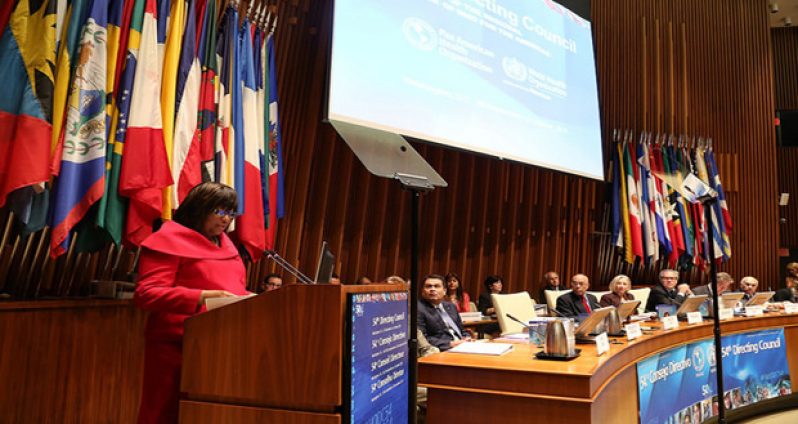THE countries of the Americas have been world leaders in collective action to advance public health goals, top health leaders said yesterday at the opening session of the 54th Directing Council of the Pan American Health Organisation (PAHO), Regional Office for the Americas of the World Health Organisation (WHO).
But overcoming persisting and new health challenges will require stronger health systems, universal access to healthcare and effective coordination and leadership of regional public health action, they said.
“We have collectively achieved much – ranging in the early years from intense capacity-building of national human resources for health to the eradication of smallpox, the elimination of polio and more recently rubella and congenital rubella syndrome, to the application of low-cost technologies for the prevention and control of cervical cancer in underserved populations, to a 2014 commitment to universal access to health and universal health coverage,” said PAHO Director Carissa Etienne. “Clearly, the Americas region is a trailblazer.”
“In our region, 27% of the population has no regular access to health services, and 46% has no comprehensive health insurance,” said Luis Almagro, Secretary-General of the Organisation of American States (OAS). “This represents enormous economic, social and human costs, not only for those who lack health services but for society as a whole. That’s why it is essential to dialogue and reach agreements about our region’s main health challenges.”
The 54th Directing Council brings together ministers of health and other high-level delegates from countries throughout the Americas for five days of discussions and decisions on regional public health. This year the meeting will examine priority health issues ranging from violence against women and dementia in the elderly, to antimicrobial resistance, workers’ health, tuberculosis and viral hepatitis.
President Juan Orlando Hernández of Honduras, a special guest at the Council’s opening session, described his country’s efforts to improve health by addressing people’s living conditions. His government has established a programme called Vida Mejor (“Better Life”) that promotes the use of “ecostoves” that reduce low-income families’ exposure to indoor air pollution while also reducing deforestation. The programme also installs cement floors to protect against parasitic infections and latrines to provide basic sanitation, and includes family planning and nutrition education. “With small changes,” said Hernández, “you can achieve major improvements”.
Emerging challenges
US Secretary of Health and Human Services Sylvia Mathews Burwell said recent global health challenges, especially West Africa’s Ebola epidemic, have taught the lesson that strong health systems are essential to prevent or mitigate the impact of outbreaks and health emergencies.
“Another lesson we’ve learned is that the world needs a nimble, effective World Health Organisation.” The United States “will continue to push for changes that make WHO better equipped to respond to the health needs of our world,” said Burwell, adding, “PAHO and the Americas region are well-positioned to champion and model these reforms.”
Emerging health threats
WHO Assistant Director-General Hans Troedsson warned that emerging health threats “are much bigger and more complex than the problems that dominated the health agenda 15 years ago.” He noted that two such challenges – growing antimicrobial resistance and tuberculosis – are on this week’s Directing Council agenda. Others include the health impacts of climate change and the rise in non-communicable diseases such as cancer, heart disease, stroke and diabetes, which are now leading killers throughout the world.
“As in the past, we can look to this region for leadership in overcoming these and many other difficult challenges,” Troedsson said. “In doing so, Member States can draw on two of the region’s unique assets: a strong sense of solidarity throughout the Americas and a great spirit of optimism.” Héctor Salazar Sánchez, chief of the Social Protection and Health Division of the Inter-American Development Bank (IDB), noted that health inequalities continue to be a major problem in the Americas. An important challenge for the region’s countries, he said, is to build political will for expanding access to healthcare and reducing out-of-pocket spending on health.
During the morning session, the 54th Directing Council elected Minister of Health Elvia Violeta Menjívar of El Salvador as its President. The PAHO Directing Council brings ministers of health and other high-level delegates from member countries to Washington, DC, to discuss and analyse health policy and to set priorities for PAHO technical cooperation programmes and regional public health collaboration.
PAHO, founded in 1902, is the oldest international public health organisation in the world. It works with its member countries to improve the health and the quality of life of the people of the Americas. It also serves as the Regional Office for the Americas of WHO. (PAHO/WHO)
54th Directing Council told… Effective leadership key in combatting region’s health challenges
SHARE THIS ARTICLE :
Facebook
Twitter
WhatsApp




.png)









